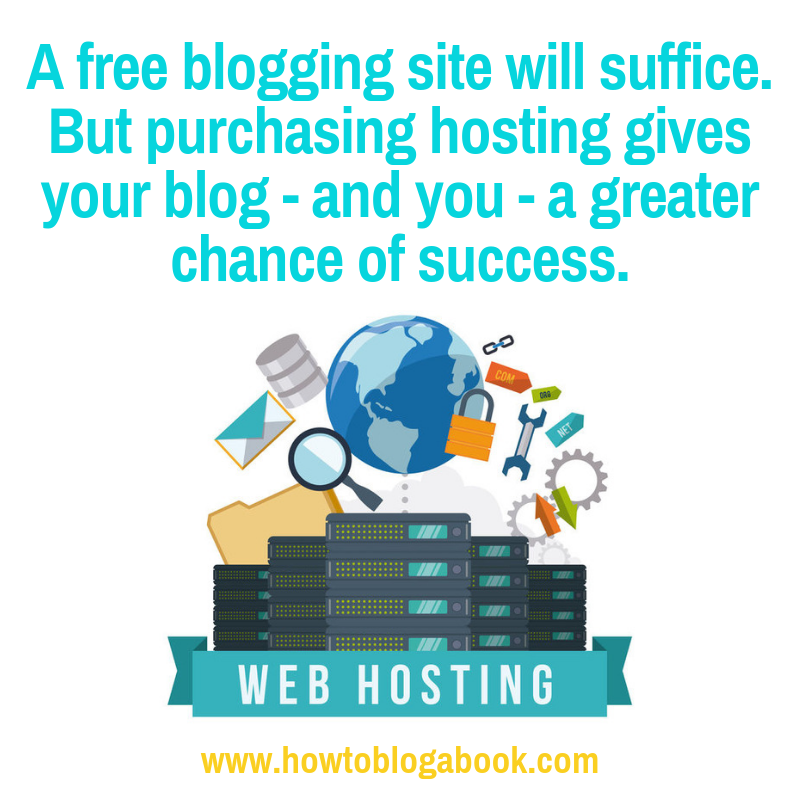A free blog may seem a great way to get started as a blogger. And these “hosted” sites can suffice for a while. Eventually, though, you will want more, and you’ll only get that with a “self-hosted” site. In today’s post, freelance writer Beth Bauer (@JourneyofBethB) explains why you do, indeed, want to pay for hosting of your bog.
It wasn’t until my second year as a blogger that I began reviewing my competitor’s blogs. I wondered how they were doing such cool things on their website. When I wrote a guest post for another blogger, I decided to ask her. She told me the features I noticed were possible because her blog was self-hosted rather than hosted (free). I wasn’t sure what self-hosting was, so I started doing some research and decided it was time to get self-hosting for my site as well.
There are numerous benefits to self-hosting your blog, which means paying for hosting from a company like Hostgator.com, Bluehost.com, Godaddy.com, or WPengine.com. And continuing with a hosted blog—usually a free blogging site—may be inexpensive but prove costly in the end. With a free (hosted) website, you can’t do everything necessary to appear professional, add automated processes, or monetize your content.
Here are a few reasons to switch your site from hosted to self-hosted—or to create your website with self-hosting from the start.
1. Customize Your Domain Name
One of the most significant advantages of having a self-hosted blog is that you get to custom a unique domain name for your website. A customized domain name can be a particularly useful marketing tool, and it makes you look like a professional. Get rid of .wordpress.com at the end of your domain name, and choose a URL that is easy to remember and recite.
2. Rankings
Another critical factor is that self-hosting allows you to optimize your blog for SEO (search engine optimization). You can customize your meta titles/snippets, change permalinks, add keywords, tags, and more.
3. A personal Email Address
Self-hosting provides you with a personal email address that matches your domain name, which creates an impression of professionalism and adds credibility. Usually, self-hosting plans include a private mailbox. You can sort emails into folders and run filters just like you can in Gmail.
4. Full Control of Your Website
One of the most significant benefits of going to self-hosting is that you own your site and make decisions about how and where it is hosted. You also can add content and analyze your results. You don’t get that level of flexibility and customization with free websites. Plus, you make the rules; you are not subject to those created by WordPress.com or blogspot.com, for example. Typically, hosting companies do not have rules for how you run your site.
5. Plug-Ins
If you want a sliding banner, social media sharing buttons, animation, or other features that make your blog more interesting, you need to add plugins. You can’t do that with most free websites. Self-hosting gives you access to hundreds of available plugins and countless options. There are also plugins to help you with site security and SEO.
9. Advertising
If you want to monetize your website through advertising, you’re going to need special plugins for banner ads, Google AdWords, and more. Many free blog options do not allow you to fully monetize your site in this way.
10. Better Technical Support
Generally, a certain level of technical support comes with your self-hosting package. Unless you have a degree in computer sciences, you’ll probably find you need professional tech help every now and then. The more plugins, customization, and pages you have, the more complex your site becomes, and troubleshooting can become far more difficult. Even setting up a WordPress site (using WordPress.org, not WordPress.com) can feel overwhelming, and many hosting companies have personnel happy to help you get up and running.
8. Improved Marketing
Every time you publish a new post on a self-hosted website, you create one more page that can be indexed by search engines, like Google. This improves your SEO because it increases the opportunity for your posts to show up in search engines, which drives new organic traffic to your blog. It’s also a sign for search engines that your website is being updated, which improves your ranking position. Once you publish a new post, search engines rank it immediately, which means more people can find you. The seeds you sew today can reap considerable rewards in the future.
9. Live Chat Option
Live chat allows you to connect with your audience in real-time. It’s not just e-commerce anymore that benefits from live chat. When your followers have questions, your ability to quickly respond builds loyalty and helps with conversion. However, you can only add the live chat option to a self-hosted blog.
10. More Storage
Free web hosting providers typically inflict storage limitations on your account. These limitations can be a problem if your content includes a lot of videos and high pixel images. The longer you blog, the more storage you’ll need. Self-hosting services come with a variety of storage plans that you can adjust according to your needs.
11. More Reliable Back-up
Most self-hosting service providers provide regular back-ups for all of your content. If your site crashes, it is usually much easier to restore it to its previous glory.
12. Improved Skills
The more you use a self-hosted site, the more you’ll learn. And the more you learn, the better you’ll get as a blogger. Things that once felt complicated will become easier and easier. You may have to study some tutorials or watch some YouTube videos. Eventually, though, you’ll look back at what you’ve learned and be impressed with your progress.
While setting up a hosted (free) site may seem the easy way to go, in the end, it can become the more difficult route. Eventually, you’ll realize you’ve grown into a self-hosted site—you need the features and benefits provided by a paid hosting company. Then you’ll have to spend time and, possibly, money moving your content to a self-hosted site.
Do you have a self-hosted blog? What benefits made you choose self-hosting? Tell me in a comment below. And if you enjoyed this post, please share it on social media or with other writers or bloggers.
About the Author
 Beth Bauer is a freelance writer, travel blogger, yoga instructor, and entrepreneur currently working on her third novel. She has traveled to over 20 countries in just the last two years and enjoys life as a digital nomad. She is originally from the Pacific Northwest of the U.S.A., and when she’s home lives on the Long Beach Peninsula with her dog, Ozzie.
Beth Bauer is a freelance writer, travel blogger, yoga instructor, and entrepreneur currently working on her third novel. She has traveled to over 20 countries in just the last two years and enjoys life as a digital nomad. She is originally from the Pacific Northwest of the U.S.A., and when she’s home lives on the Long Beach Peninsula with her dog, Ozzie.
Photo courtesy of Diana Johanna Velasquez


how so i monetize my blog
There are lots of posts here on the site about monetizing your blog. Do a search.
I have not once regretted it since I went self-hosted last year. Love that you highlight the amazing benefits having full control gives a blogger. 🙂